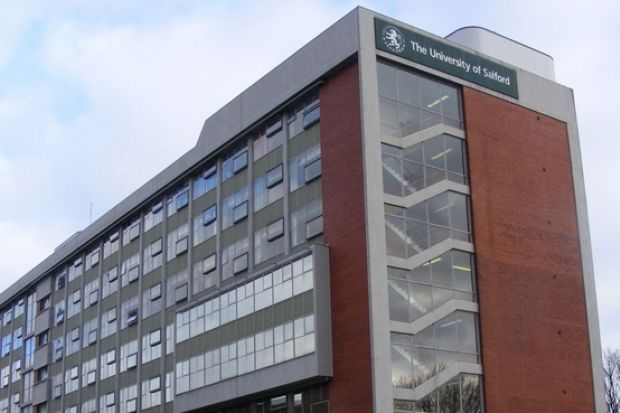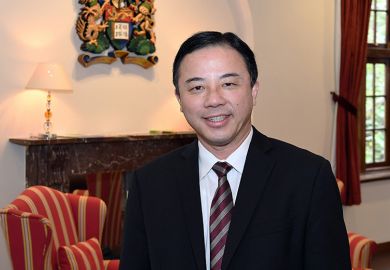Maxwell Building, University of Salford
The document, seen by Times Higher Education, also suggests that more than 1,000 current students and 75 jobs will be affected by the plans – focused on the law school and the School of Humanities, Languages and Social Sciences (HuLSS) – as the university undergoes a major reshaping to focus on applied and vocational subjects.
However, the university has insisted that any students who have already applied to Salford for 2013-14 entry will be able to follow their chosen courses through to graduation.
The document outlines a communications strategy to handle “what without doubt will be a very controversial announcement on 5 June”, and warns of likely demonstrations and strikes on campus.
Last week, Salford announced plans for up to 87 redundancies in professional services, which the University and College Union described as the 12th round of job cuts in the last 18 months.
Marked “confidential”, the leaked document warns: “The impact of school and programme closures on the student community cannot be underestimated, particularly if they hear about this directly from their tutors/lecturers.”
It adds: “Alongside the 1,200 current students and 75 employees affected by the proposals relating to HuLSS and Law, there are 1,586 UK/EU offer holders across the 2 schools at UG [undergraduate] and PG [postgraduate] level, of whom 245 have to date accepted their offers.”
The Universities and Colleges Admissions Service deadline for prospective undergraduates to select one firm and one insurance choice of institution – and decline the three other offers – is 8 May, the document notes.
“If we have not informed offer holders before the 8th May of the proposed changes, and they have chosen us as their firm or insurance choice, there is likely to be significant backlash because we have limited their alternative options,” it adds.
“If we have not been able to secure agreement with other HEIs to accept these offer holders by this time, then the damage will be greater; where we are able to advise them that alternative arrangements are in place (i.e. x university has agreed to accept them), the damage is somewhat mitigated – albeit only slightly.”
There is likely to be impact on student recruitment across the entire university “as people make assumptions about the health and sustainability of the institution”, it says.
The document says it is “important to acknowledge that current and prospective students WILL be impacted by these changes” as “even students and applicants whose programmes are not being taught out or transferred will witness staff demonstrations, picket lines and lowered morale together with the associated negative publicity in the local, regional and/or national press”.
On social media, the document warns of the “viral effect of any messaging” in terms of negative responses to the changes.
On the university’s own message, it says: “Clear articulation of the reasons for the changes and the benefits of the re-focusing of the university on its traditional areas of strength (real-world, applied, technology-related etc) are absolutely essential. These messages must be communicated and reinforced consistently and continuously to all stakeholders, including enquirers, applicants, our feeder institutions and our agents.”
There is also a warning about the potential response from the university’s trade unions. Under a heading of risk, the document says of the unions: “Strike action a high possibility. Will certainly fan the flames via the media.”
A Salford spokesman said: “As is well known, changing patterns in student demand mean that universities must constantly review their portfolio of courses. At the University of Salford we are experiencing strong demand in many areas and, predictably, less demand in others.
“As a responsible university, Salford must plan for a number of situations and, as such, this is a draft internal working document for consideration and has not been approved at any level. Whatever decisions the university may ultimately take, the student experience will remain at the forefront of its considerations.”
The spokesman also added in a later statement: “All students who have applied to study at Salford for the 2013-14 academic year will have their chosen courses taught through to graduation.”
But the UCU’s regional official for the North West, Martyn Moss, said: “The University of Salford already has the unenviable tag as Britain’s most prolific university for axing staff. This damaging memo paints the university in a callous and uncaring light.
“It appears to have no regard for either its hardworking staff or students making potentially the biggest decisions of their lives. We are really disappointed the university has ignored the unions and pursued such a damaging approach.”
Register to continue
Why register?
- Registration is free and only takes a moment
- Once registered, you can read 3 articles a month
- Sign up for our newsletter
Subscribe
Or subscribe for unlimited access to:
- Unlimited access to news, views, insights & reviews
- Digital editions
- Digital access to THE’s university and college rankings analysis
Already registered or a current subscriber? Login




